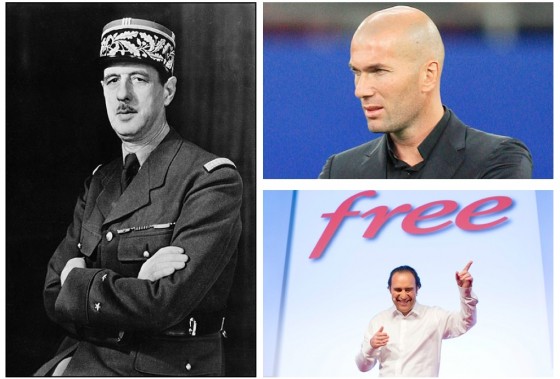18th Nov. '12 (1).jpg)
 Zinedine Zidane, Charles de Gaulle and Xavier Niel.
Zinedine Zidane, Charles de Gaulle and Xavier Niel.
What do these three have in common? According to my French colleague Severine LeLoarne, Head of Management Department at university Grenoble Ecole de Management, these are some of the key French leaders that anyone in France would know. Charles de Gaulle, because he made such an impact as a general and a statesman; Xavier Niel – a notable entrepreneur and the founder of Free, an Internet operator competing with such giants as Orange; and yes, indeed, Zidane also made it to the list for having expanded the scope of football fans in France (ladies included).
What does it mean then to be a good leader in France?
In contrast to my colleague Severine, instead of Zidane, I would probably add another French football figure to the list – Aime Jacquet, the coach of the French football team, leading them to a victory of FIFA World Cup back in 1998. Why did they win? Michel Hildago, who won the country’s first major title, declared, “This is Aime Jacquet’s crowning moment, achieved against winds and tides. There are 60 million happy French people. What they did was just extraordinary.” The victory came not really because the team was technically superior, but because they had a strong team spirit and there was cohesion among the players
General Director of a French company Amcad Engineering, Tony Gasseling, explains: “90% of the business is the team, the remaining 10 % is everything else: technology, patents, the money”. Of course, it is also a matter of effective communications and decision-making: “As a creator of a startup, I hire people who are highly skilled and many of them have Ph.D. – you cannot just say to everybody that you are right and this is how things will be and that everybody has to just follow you. Even when you have to make the final call, it is essential that all decisions are understood. This is good leadership.” Being a boss truly does not come with the title, and this becomes even more apparent with leading younger generations.
Young leaders and young followers
Being in her thirties, Severine points out: “Even if I apply to my generation, I don’t like to be managed, I rebel against authority, but if the leader can inspire me and prove his reputation, his expertise, I play by the rules – the students react in the same way.” What seems to be needed is a democratic approach, but with a touch of authority.
“Inspiration is the key, students want to work for companies and leaders who offer vision and a promise of a dream”, – explains Severine. In some of the recent studies regarding where students would like to work, there are two companies at the top – Google and Michelin. The two are very different – Michelin being a family company where you respect the rules and Google being a creative environment, where you can devote your time to proposing ideas. But both appeal to individualistic nature and offer interesting career paths for ambitious souls.
At the same time, while it is clear what young followers seek in their employers and bosses, are they eager to match up with their own expectations? Severine makes an observation common among her students: “Young people want to become leaders for the money and prestige that a high position offers, instead of realizing the big responsibility for the people and the work of others that comes with it.” Every young leader is quickly to learn that responsibility is not only managing budget and finances, but what’s critical – people, with their skills, hopes, dreams and aspirations.
The basic message seems to be: in order to lead, you need to gain credibility, but at the same time not to act against everybody else. “As a leader, I have to explain my point of view and defend it, instead of forcing, otherwise, there will surely be a silent rebellion and people will not turn ideas into action or they will be demotivated”, – comments Tony on the French mentality.
Drawing from his experience, Tony adds: “If you lead the fifty-year-olds, it is the old management style: tasks have to be given from the top for people to act upon. When I work with young people, the mentality is different. New generation is individualistic, if you want them on your side, you need to listen to them and take their views into account.”
As Tony concluded, “a French leader must have big ears and big voice – benefit from the input offered by your team, but also to make your ideas heard and understood”. So speak up and let us known what do you think about current status of leadership and contemporary leaders en France?
Left: Tony Gasseling-General Director of Amcad Engineering, Right: Severine LeLoarne- Head of Management Department at University Grenoble Ecole de Management
Comments:
![tony1[1]](http://nofear-community.com/blog/wp-content/uploads/2012/11/tony11.jpg)
![severine1[2]](http://nofear-community.com/blog/wp-content/uploads/2012/11/severine12.jpg)
